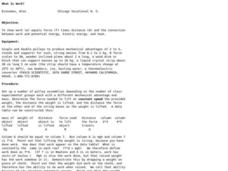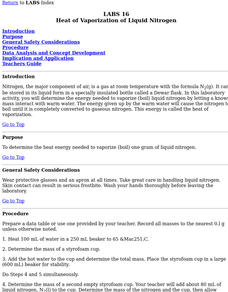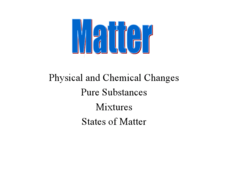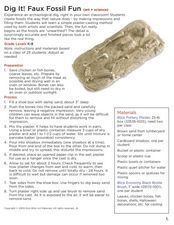Curated OER
Watercycle
Third graders examine the natural circulation of water from oceans, lakes, and rivers to evaporation into the air, and then to condensation to produce rain falling back to the soil as components of the water cycle.
Curated OER
How Do You Dew?
Students examine how the processes of condensation and evaporation occur. They describe the relationship between heat energy, evaporation and condensation of water on Earth. They give examples of the processes of evaporation and...
Curated OER
What is Work?
Students investigate the connection between work, potential energy, kinetic energy, and heat. In this physics lesson, students use pulleys to produce mechanical advantages and incline planes to demonstrate energy conversion.
Curated OER
Cool Times with Heat
Students work with thermometers to complete problems about temperature. They investigate cooling patterns, how location affects temperature, and what happens when water having different temperature is mixed. They measure temperature in...
Curated OER
Heat of Vaporization of Liquid Nitrogen
Students determine the heat energy needed to vaporize (boil) one gram of liquid nitrogen.
Curated OER
Precipitation
Students investigate the formation of rain. They experiment by boiling water in a tea kettle and placing ice cubes and water in a pan. They hold the pan of water over the steaming spout so that the steam strikes the bottom and sides of...
Curated OER
Carbon Dioxide: The Heat is On
Students examine the greenhouse gases affecting the atmosphere. In groups, they participate in activities in which they examine the effects of heat on the atmosphere and phytoplankton. They research how the phytoplankton differ in warm...
Curated OER
Using A Winogradsky Column to Analyze Microbial Communities
Students use easily obtained materials to study ecological succession in a microbiological community. They collect water samples from outdoor sources in plastic bottles to observe and record changes.
Curated OER
Breaking News English: Green Invitation
In this cardboard box solar cooker worksheet, learners read the article, answer true and false questions, complete synonym matching, complete phrase matching, complete a gap fill, answer short answer questions, answer discussion...
Texas State Energy Conservation Office
Investigation: Gas Laws in Action - Propane
Using helium as an example of propane, physical science middle schoolers experiment with and graph the relationship between temperature and volume in gases. In a whole-class demonstration, they show how molecules behave under different...
Curated OER
Temperature
Several slides compare different temperature scales. Thermal expansion, heat transfer, and Maxwell speed distribution are also explored. The last two slides seem unrelated to the topic of heat, but are easily left out of this otherwise...
Utah Education Network (UEN)
Microwave Magic
The microwave is a staple in many American households, but how exactly does it work? Approach this question from a scientific and practical standpoint, and discover cooking strategies, recipes, and methodologies for the standard microwave.
LABScI
Freezing Point Depression: Why Don’t Oceans Freeze?
Can you go ice fishing in the ocean? Learners examine the freezing point of different saltwater solutions. Each solution has a different concentration of salt. By comparing the freezing points graphically, they make conclusions about...
Curated OER
Matter
In a neat and straightforward manner, this PowerPoint delivers basic introductory information on the properties of matter, physical and chemical changes, and pure substances vs. mixtures. It also defines the states of matter. For some...
International Technology Education Association
Pixel This!
Did the image I drew match the image you saw? By simulating a satellite and a ground station, teams of two transmit data in the form of pixels in order to recreate an image. They use four different levels of brightness, creating slightly...
Curated OER
More on Conduction and Convection
Why do some items feel colder when they are the same temperature? How should you keep your soda cold? What makes the wind blow? These are just some of the things middle schoolers discover when completing a lesson on conduction and...
LABScI
Botany: The Plant Dissection Lab
Study everything about plants! The 12-part series of lessons continues with an examination of many aspects of plants. Components of the laboratory activity address the growth and structure of plants by evaluating familiar plants. The...
Curated OER
Vapor Pressure
This extensive collection of slides begins with diagrams of molecules undergoing evaporation, progresses through methods of measuring pressure, demonstrates how to perform pressure calculations, and then explores the temperature-pressure...
Curated OER
Faux Fossil Fun
Elementary schoolers investigate how fossils are created by reproducing the process of creating an impression and filling it with a hardening material. The art lessons from this source are just fantastic! The lesson plan is well-written...
Curated OER
Classification of Matter
This is a great worksheet with an infographic to assist your students in categorizing matter into mixtures and non-mixtures. Information is given about the metric system of measurement. Your young students match 13 terms with their...
Science Geek
Intermolecular Forces of Attraction
Chemists love London (dispersion forces)! Presentation begins with an explanation of intermolecular forces including hydrogen bonding, dipole-dipole attraction, and London dispersion forces. It also covers polarity and the relative...
Curated OER
A Healthy Diet is a Balancing Act
It's important to teach kids how to have a balanced diet. They are provided with six different meals, they fill in the blanks to complete each one to make it balanced. The answers could be anything and the meals offered don't seem very...
Curated OER
Why did the can crush?
Students watch a demonstration to ascertain why a soda can crushed. They make observations and hypothesize about why a soda can crushed and relate the difference in pressure to its affect on objects around us (soda can). Explanation is...
Curated OER
Ziplock Chemistry
Learners investigate various chemical reactions when creating mixtures in ziplock baggies. In this chemistry lesson plan, students will recognize various chemical reactions and cite evidence. Safety and assessment strategies are included...

























